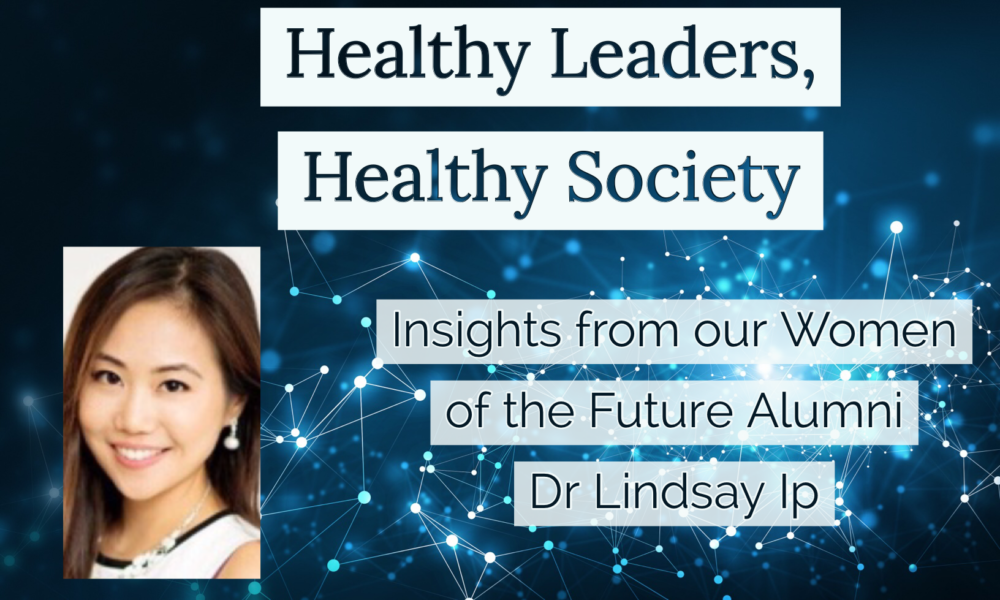
Adapted from the presentation at the WOF network event on 27th Feb, 2020
Dr Lindsay Ip was shortlisted in the Professions category for the Women of the Future Awards in 2017. Lindsay brings networks of primary care and community assets to work together to reduce health inequalities in South East London. She also led a triple-award winning innovative service that drives a bio-psycho-social model of collaborative care for the chronically ill across Guy’s and St Thomas’ Hospital and King’s College Hospital. Moreover, she has a private practice on Harley Street and sees patients for psychotherapy, coaching and medico-legal assessments. Lindsay is Stanford trained and worked in both the US and the UK. She has over ten years of experience providing individual, couples and family psychotherapy in a variety of medical, community and mental health settings. In addition to clinical work, she has advised mental health, social media and educational start-ups and is also active in promoting a culture of well-being and resilience in educational settings and work places, including A&E staff and teachers and UK Army generals. She also engages the media to help reduce stigma and promote better mental health.
The current pandemic poses a new level of challenge to leaders from all sectors as they need to adapt quickly in order to survive, not to mention, thrive. Anxiety and stress levels are sky-rocketing amidst uncertainty about health, the economy, and the mental health impacts of phys-ical isolation from others. As a result, people tend to turn to their leaders and role models for guidance and therefore, the physical, emotional and spiritual health of leaders become even more salient.
So, what is a healthy leader? There are a myriad of skills one can practice to be a heathy, adap-tive leader in this ever-changing environment—these include emotion regulation, flexible and dialectical thinking, having a purpose, empathy, listening and communication skills, having sup-port, taking time out to reflect and to have moment to moment awareness while engaging fully in the present etc. However, from my clinical experience, one of the most important foundations (and this is where spiritual and emotional health intersects) that enables these skills to be success-fully applied is connecting to a source of compassion that forms the basis of your worth. These can be a form of self-compassion, meaningful and supportive relationships, or God if faith is an important part of your life. Having self-compassion or basing your worth on a reliable source of compassion is like seeing yourself as the sky, something you accept as is – with inherent value, rather than seeing yourself as the weather, which can change based on factors you cannot com-pletely control.
But why is having a relatively more secure sense of self based on compassion, rather than exter-nals standards and KPIs, important for leadership? There are at least three reasons.
More objective and purposeful decision-making
Leaders make difficult decisions all the time and often when made under stressful situations, we tend to fall back on our default mode which is driven by the unconscious to defend us against anxiety and protect our egos. When your worth is based on your standards, or entirely on your business, there is more at stake which increases anxiety and biased judgment. A healthy leader is passionate about making a difference but knows the difference between passion and idolatry. Some of the most satisfied entrepreneurs I met are passionate about making a difference, but their identity is not attached to the business, profession or role. They are more accepting of being re-placed, because they understand when they are not needed anymore, that could mean they have solved the problem that their role was set out to solve in the first place, or they are happy that someone else has a better solution, and they move on to the next thing.
Better ability to work across boundaries
Secondly, having self-compassion allows you to have more compassion and empathy towards others which is important for joint working and working across boundaries and systems with dif-ferent cultures. This is particularly important in our currently rather divided world. Almost all leaders tasked to solve wicked problems such as poverty, climate change, mental health and ine-qualities identified that the most challenging part of their role is getting people to work together in a way that benefits the wider society. Systemic changes involving all sectors are required when we address wicked problems where no one knows the solution to. For example to have a healthy society, healthcare alone cannot be the answer, instead decisions from all sectors need to consider the wellbeing of their employee and customers and on the other hand, the NHS as a large employer for example, need to think about their social and environmental value such as through their hiring and procurement practices. However, it is very common to see departments and industries still working in silos and being suspicious about collaboration, especially when the incentive system is not aligned. As MIT professor on leadership Otto Scharma emphasized, for our society to flourish and the social, spiritual and ecological divide to be resolved, leaders need a fundamental shift in consciousness – from ego-system awareness to eco-system awareness. This means considering what’s good for the wider society and our roles in it. Compassion plays a big role in this and allow for more inclusive and co-creative ways of working. A secure self also al-lows more willingness to share power with other members of society, which is essential to solve wicked problems, but very challenging for many to do.
More capacity to create psychological safety and contain anxiety
Thirdly, well-being is so important for a leader not just because the responsibility and job is stressful but also because from a psychological perspective, a big part of a leader’s role is to con-tain others’ anxiety as well. This requires leaders to have healthy emotional boundaries. We all know that change is the only constant and with every change, there is usually something to lose and something to gain. Resistance is often a reaction to loss and the leader’s role is to create con-ditions that enable psychological safety and manage anxiety so that it is at a level most conducive to positive and purposeful change. This could be done by forming a shared purpose, encouraging dialogue across boundaries so that people can make sense of the whole system, enabling a sense of belonging, making sure people are not reinforced for working inhumane hours etc. In fact, psy-chological safety has been found through Google’s project Aristotle, to be the biggest predictor of team performance and effectiveness.
With these links between a healthy self and a healthy society in mind, here are three questions you could reflect on in relation to your own wellbeing and your ability to positively influence the rest of society.
1. What values are you hoping to express through your work? What thoughts or fears may get in the way and how are you tapping into sources of compassion and support to help you over-come them?
2. What am I willing to let go of in order to work better together with the rest of society?
3. What is one tangible small change I can implement right away to enable more psychological safety in the workplace or other spheres of influence?
If you are interested in more practical tools, below are some helpful resources. I’m also develop-ing an e-learning course on systems leadership. If you’d like to get in touch, email me at lindsay-ip.dr@gmail.com
Health and wellbeing toolkit for staff by King’s Health Partners
https://www.kingshealthpartners.org/assets/000/002/811/Mind___Body_Health_and_Wellbeing_Toolkit_for_Staff_original.pdf?1558541663
How can businesses contribute to people’s health? A guide for leaders by the Health Foundation
https://www.health.org.uk/sites/default/files/upload/publications/2018/Blueprint_Health%20Foundation_How%20can%20businesses%20controbute%20to%20people%27s%20health.pdf
Maintaining health and wellbeing during Covid-19 pandemic by King’s College Lon-don
https://www.kcl.ac.uk/ioppn/maintaining-health-and-wellbeing-during-the-covid-19-pandemic
Compassion cultivation training by the Compassion Institute, Stanford University
